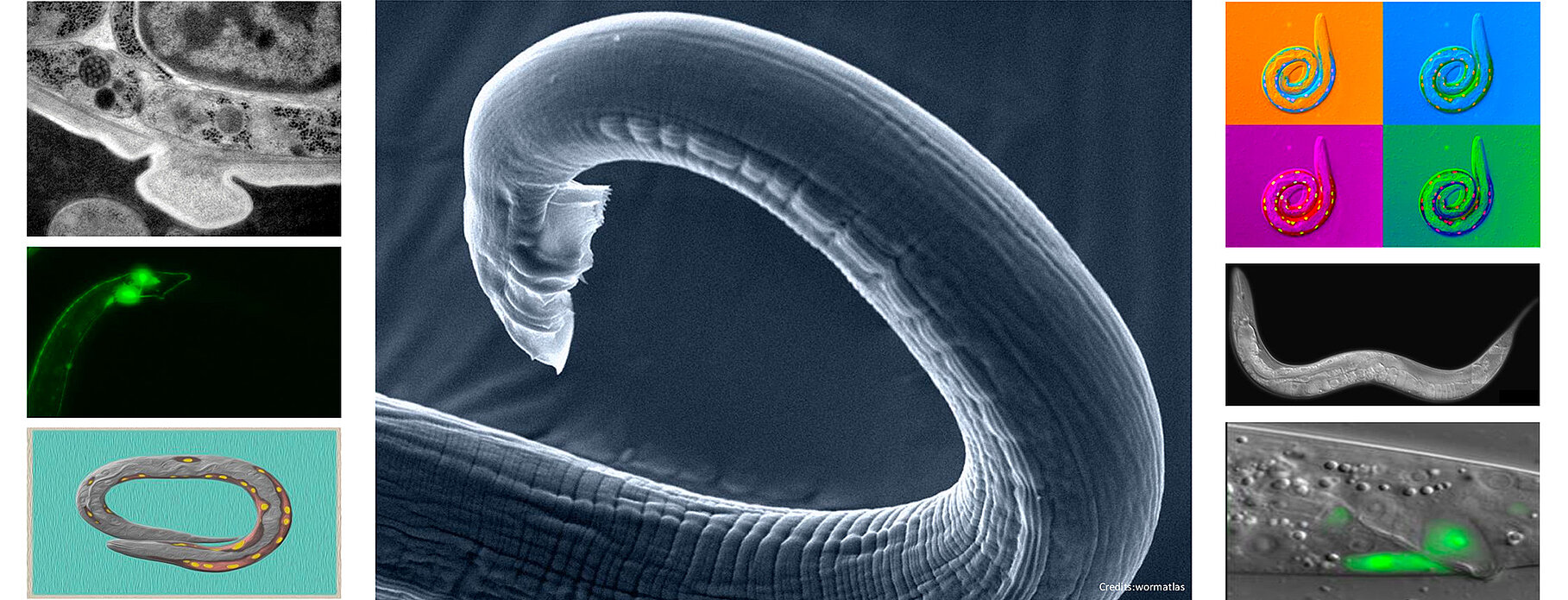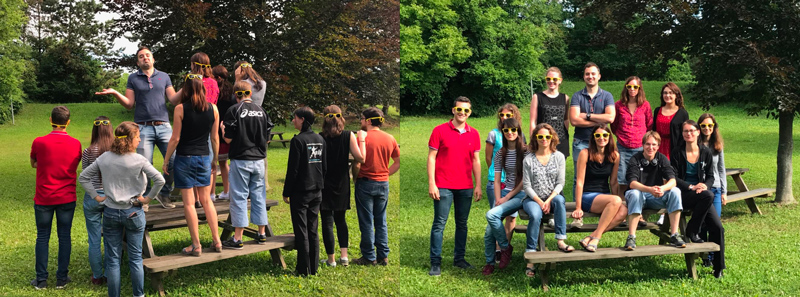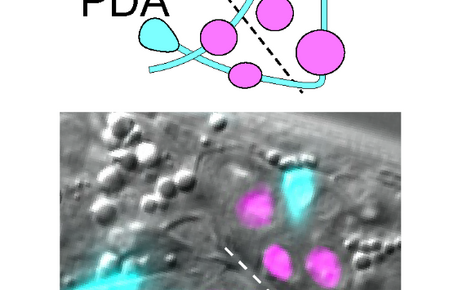
Plasticité cellulaire et reprogrammation directe chez C. elegans
Plasticité cellulaire et reprogrammation directe chez C. elegans
Les cellules ont plus d’un tour dans leur sac !!! Alors que la plupart des cellules différenciées conservent leur identité spécialisée toute leur vie, certaines peuvent changer d'identité et devenir autre chose !!! Nous étudions ce phénomène fascinant, et la reprogrammation directe en particulier, qui est le processus par lequel une cellule différenciée devient un autre type de cellule différenciée (aussi appelé transdifférenciation ; consultez notre article Lambert at al, 2021 pour une discussion plus philosophique de l'identité cellulaire et ses définitions).
Comment cela peut-il se produire, et surtout comment cela peut-il se produire naturellement dans un grand nombre d'espèces ? Il existe de nombreux exemples de plasticité cellulaire dans des contextes physiologiques, expérimentaux et pathologiques, mais la manière précise dont une cellule différenciée peut changer d'identité reste obscure. Les travaux du laboratoire visent à explorer les nombreuses questions que soulève un tel phénomène : Qu'est-ce qui permet à une cellule précise de changer d'identité et quelles sont les étapes et la trajectoire cellulaire en jeu ? Dans quelle mesure les différents processus de reprogrammation sont-ils similaires ? Ce phénomène se produit-il uniquement dans des cellules spécifiques ? Existe-t-il des mécanismes permettant de supprimer la reprogrammation dans les autres cellules ? Comment l'environnement influe-t-il sur ce processus ?
Pour aborder ces questions importantes, nous avons établi un modèle puissant et innovant, nous permettant d’examiner des événements naturels de reprogrammation directe in vivo, visualisés à l’échelle de cellules uniques, chez le nématode C. elegans. Par exemple, nous avons disséqué comment une cellule rectale change d'identité pour devenir un moto-neurone. Grâce au lignage cellulaire invariable de ce ver microscopique transparent, notre système nous donne accès à toutes les étapes du processus, y compris les plus précoces, un atout unique. Nous avons commencé l'identification systématique des réseaux moléculaires et la dissection des exigences cellulaires qui sous-tendent plusieurs conversions directes de type cellulaire in vivo, et nous utilisons une combinaison d'approches génétiques (mutants et ARNi), d'imagerie, de recombinaison du génome (CRISPR-Cas9), de biochimie et de transcriptomique (ARN Seq en cellule unique).
Nos approches intégrées contribueront à élucider non seulement les mécanismes clés qui permettent à une cellule différenciée de devenir plastique et de changer d'identité, mais aussi les principes fondamentaux régissant le maintien et la reprogrammation de l'identité cellulaire. Ces connaissances ont des implications thérapeutiques importantes, car elles permettront d'approfondir notre compréhension de l'initiation de certains cancers et d'améliorer notre capacité à reprogrammer les cellules à des fins de médecine régénérative.
Vous avez envie d’élucider les prochaines questions dans le domaine de la plasticité cellulaire ? N’hésitez pas à nous envoyer une candidature spontannée (sophie@igbmc.fr)

Membres
Chercheur(euse)s
Doctorant(e)s
Ingénieur(eure)s
Projets en cours
We are hiring!
We are looking for an outstanding scientist to join a wider collaborative project studying the nature of cellular transitions between 2 identities, at the unique cell level
Our laboratory “In vivo cellular plasticity and direct reprogramming” at the IGBMC investigates fundamental cellular & molecular mechanisms underlying cell identity maintenance and reprogramming, using a combination of genomics, different genetic approaches and imaging technologies.An ANR-funded 2years postdoctoral position, starting early 2025, is available to join our lab at the IGBMC in Strasbourg, France. We have pioneered the study of natural instances of cellular reprogramming establishing the worm as a unique model, while fostering a creative and enthusiastic working atmosphere in the lab. C. elegans has proved a powerful model to unravel conserved principles underlying how a cell can naturally change its identity.
The project will take advantage of existing scRNAseq data detailing with minute precision the terminal differentiation of a cell and generate similar dataset for a transdifferentiating cell. The project aims to elucidate the TF cascade and GRN controlling the transition states between 2 identities, one of the biggest open questions in the field, and to compare it to those observed during induced reprogramming in mice through our collaborators.
Our team is part of the Development & Stem Cells Department, at the IGBMC, in Strasbourg, France. This Research Institute (www.igbmc.fr) provides access to state-of-the-art facilities and a vibrant international research environment. For more information about the group, please visit: http://igbmc.fr/jarriault
The successful candidate should have a PhD (or be in the final stages of completion) and be highly motivated with a strong interest in Developmental and Stem Cells Biology. The ability to work both independently and as a team member and experience in the use of molecular biology and genetic techniques are essential. Experience in working with C. elegans is a plus. Note that a very good track record and at least one publication as a first author is required.
Applicants should email a motivation letter, a CV, a description of research projects & experience as well as the name and contact info for 3 referees to:
Sophie JARRIAULT - e-mail : sophie.jarriault@gmail.com
Financements et partenaires
Nos recherches ont bénéficié des financements suivants :
- ERC Consolidator Grant PlastiCell
- PEPR Cell-ID (G. Almouzni coord.)
- ANR CellPATH (Coordinator)
- ITN NervSpan (D Dupuy coord.)
- PRI NeuroLicencing (w. P Laurent, ULB)
- COST Grant BM1408 (Chair)
- ANR
- EMBO YIP networking grant / european GENiE network
- Ligue Nationale Contre le Cancer (LNCC)
- Association Française contre les Myopathies «AFM pôle IGBMC »
- EuroSyStem European Network of excellence
- Fondation pour la Recherche Médicale (FRM)
- Association pour la Recherche contre le Cancer (ARC)
- Association Française contre les Myopathies (AFM)
- ATIP de Biologie Cellulaire and ATIP+ de Biologie Cellulaire (CNRS)

Actualités

Est-ce que se diviser change ses chances d’être reprogrammée pour une cellule ?
La transdifférenciation est la conversion d'un type cellulaire entièrement différencié en un autre type. Dans une étude publiée dans Cell Reports, les…
Lire la suite
Prix/Distinctions
- ERC CoG grant
- AcademiaNet (Nominated by EMBO)
- Grand Prix pour la Recherche Fondamentale, Académie des Sciences / Fondation Générale de Santé
- EMBO YIP (Young Investigator Programme) Award
- EuroSyStem Young Investigator Award
- Prix Scientifique de la Fondation Schlumberger Pour la Recherche et l’Enseignement (FSER)
- Prix Scientifique de la FRM
- « Initiative postdoc - retour », Ministère de la Recherche, des Sciences et de l'Enseignement
Ressources
Notre équipe est un des fondateurs du réseau européen GENiE: https://worm-genie.eu/ 
- Ecoutez Marie Charlotte, ancienne étudiante en thèse, expliquer son projet en 3 min (1er prix "ma thèse en 180 secondes"):
- Regardez une présentation de nos thématiques à l'occasion de la célébration des 10 ans de l'ERC: http://www.canalc2.tv/video/14415
- Notre dernière revue en accès libre sur la plasticité cellulaire chez le ver: https://www.genetics.org/content/213/3/723.full
- WormBook http://wormbook.org/
- WormBase https://wormbase.org/
- WormAtlas https://www.wormatlas.org/
- Nos articles en accès libre:
- Riva et al 2021 https://doi.org/10.1101/2021.05.05.442643
- Ahier et al 2020 https://doi.org/10.17912/micropub.biology.000339
- Gomez-Saldivar et al 2020 https://doi.org/10.1534/genetics.120.303774
- Morin et al 2020 https://www.micropublication.org/journals/biology/micropub-biology-000218/
- Vibert et al 2018 http://www.ijdb.ehu.es/web/paper/180123sj/wound-healing-cellular-regeneration-and-plasticity-the-elegans-way
- Götz & Jarriault 2017 https://journals.biologists.com/dev/article/144/15/2714/48056/Programming-and-reprogramming-the-brain-a-meeting
- Doitsidou et al 2016 https://www.genetics.org/content/204/2/451.short
- Becker & Jarriault 2016 https://www.sciencedirect.com/science/article/pii/S0959437X16300892
- Zuryn et al 2014 https://science.sciencemag.org/content/345/6198/826
- Ahier & Jarriault 2014 https://www.ncbi.nlm.nih.gov/pmc/articles/PMC3948794/
- Zuryn & Jarriault 2013 https://www.tandfonline.com/doi/full/10.4161/worm.25081
- Kagias et al 2012 https://www.pnas.org/content/109/17/6596.long
- Morin & Jarriault 2011 https://www.medecinesciences.org/fr/articles/medsci/full_html/2011/03/medsci2011273p331/medsci2011273p331.html
- Richard et al 2011 https://www.ncbi.nlm.nih.gov/pmc/articles/PMC3188571/
- Zuryn et al 2010 https://www.ncbi.nlm.nih.gov/pmc/articles/PMC2940307/
- Jarriault et al 2008 https://www.ncbi.nlm.nih.gov/pmc/articles/PMC2268801/
Publications
2025
Article dans une revue
Essential and dual effects of Notch activity on a natural transdifferentiation event
- Thomas Daniele
- Jeanne Cury
- Marie-Charlotte Morin
- Arnaud Ahier
- Davide Isaia
- Sophie Jarriault
Nature Communications ; Volume: 16 ; Page: 75
2024
Article dans une revue
Developmental plasticity: a worm's eye view
- Sophie Jarriault
- Christelle Gally
Journal of Experimental Biology ; Volume: 227
2022
Article dans une revue
A natural transdifferentiation event involving mitosis is empowered by integrating signaling inputs with conserved plasticity factors
- Claudia Riva
- Martina Hajduskova
- Christelle Gally
- Shashi Kumar Suman
- Arnaud Ahier
- Sophie Jarriault
Cell Reports ; Volume: 40 ; Page: 111365
2021
Chapitre d’ouvrage
Preface, Préface
- Sophie Jarriault
- Benjamin Podbilewicz
Nematode Models of Development and Disease ; Volume: 144 ; Page: xv-xvii
Chapitre d’ouvrage
On the origins and conceptual frameworks of natural plasticity—Lessons from single-cell models in C. elegans
- Julien Lambert
- Carla Lloret-Fernández
- Lucie Laplane
- Richard Poole
- Sophie Jarriault
Nematode Models of Development and Disease ; Volume: 144 ; Page: 111-159
2020
Article dans une revue
Gene bashing of ceh-6 locus identifies genomic regions important for ceh-6 rectal cell expression and rescue of its mutant lethality
- Arnaud Ahier
- Shashi Kumar Suman
- Sophie Jarriault
microPublication biology
Article dans une revue
A simple PCR-based method to follow and genotype alleles with single nucleotide changes
- Marie-Charlotte Morin
- Sarah Hoff-Yoessle
- Sophie Jarriault
microPublication biology
Article dans une revue
Tissue-Specific Transcription Footprinting Using RNA PoI DamID (RAPID) in Caenorhabditis elegans, RAPID, une méthode pour révéler les empreintes transcriptionelles de tissus spécifique en utilisant Pol DamID chez C. elegans
- Georgina Gómez-Saldivar
- Jaime Osuna-Luque
- Jennifer I Semple
- Dominique A. Glauser
- Sophie Jarriault
- Peter Meister
Genetics ; Volume: 216 ; Page: 931–945
2019
Article dans une revue
Developmental Plasticity and Cellular Reprogramming in Caenorhabditis elegans
- Joel Rothman
- Sophie Jarriault
Genetics ; Volume: 213 ; Page: 723 - 757
2018
Article dans une revue
Wound healing, cellular regeneration and plasticity: the elegans way
- Laura Vibert
- Anne Daulny
- Sophie Jarriault
International Journal of Developmental Biology
Page 1 sur 3
